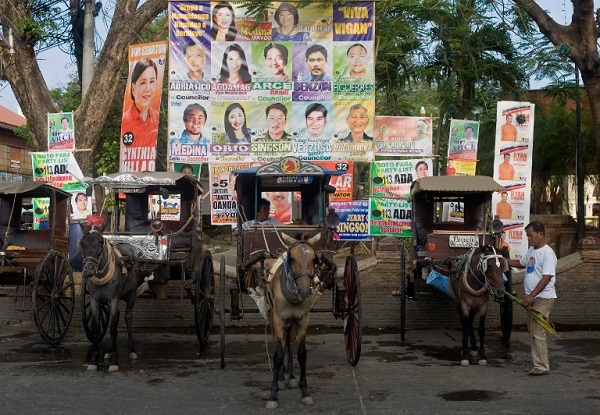Candidates scramble to get votes for sale

The driver of a horse-drawn carriage waits for passengers in front of posters promoting candidates in mid-term elections in Vigan, north of Manila on April 14, 2013. In the homestretch of political campaigning, candidates have been scurrying to clinch votes for sale to ensure their victories, a social science instructor in a state university said. AFP/KARL MALAKUNAS
SCIENCE CITY OF MUÑOZ, Philippines—In the homestretch of political campaigning, candidates have been scurrying to clinch the “market votes” or votes for sale, to ensure their victories, a social science instructor in a state university here said.
“Market votes come from those who will vote for candidates who can give them favors, including monetary favors,” said Gian Carlo Bumanlag, an instructor at the College of Arts and Sciences of the Central Luzon State University (CLSU) here.
Bumanlag used to be a youth coordinator, municipal coordinator, chief of staff and campaign manager of candidates for elective posts before he worked in the academe. He is finishing the draft of a book on political campaign management.
“Turning to market votes is a strategy employed by some of the candidates for high local elective positions especially if the “command votes” in their favor are thin,” Bumanlag said.
Command votes are those to be delivered by the die-hard supporters, relatives, and friends of the candidates, and the bloc voting of some religious groups, according to Bumanlag.
Article continues after this advertisement“Simply put, it (courting market votes) is vote-buying and it is part now of the political culture. It is happening, known to many but it is not openly talked about,” he said.
Article continues after this advertisementFor the market vote, each target voter is paid P500 to P1,000 for the mayoral candidate and for other posts, P200 to P300.
He said in a relatively small city or town, a sure 1,000 to 2,000 votes can spell a big difference in the outcome. Bumanlag said the “vote buyers” would not be the candidates themselves but their closest of kin.
“They move at night, ginagapang ‘yong mga botante sa kani-kanilang bahay lalo na sa malalayong barangay (they approach voters in their houses, especially those in remote villages),” he said. Many of the voters are like flowers ready to be pollinated, waiting for these vote buyers, according to Bumanlag.
He said some voters told him the elections have provided them the opportunity to gain something in the exercise of their right. “Ngayon lang naman ang pagkakataon natin na makinabang sa kanila. Pagkatapos ng eleksyon, hindi na naman tayo kilala (This is the only time we can benefit from them. After the elections, they will not recognize us anymore),” Bumanlag quoted some voters as saying.
The “single vote,” applicable to those running for members of the city or town council, happens when a voter is paid to vote for only one particular candidate for the post, according to Bumanlag.
The amount given to a voter would range from P300 to P1,000, he said.
He said some candidates would employ “outside poll watchers.” They are people outside the precincts and are tasked to monitor who have voted and report it to the coordinator who will then fetch voters who have yet to vote.
They are also tasked to hand out campaign materials and sample ballots for their candidates.
“They are paid P500 each, and of course, they should be voting for the candidates who appointed them. If you have 200 outside poll watchers, that’s sure 200 votes,” Bumanlag said.